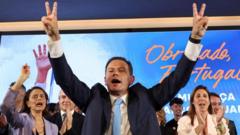In a dynamic and closely watched electoral battle, the ruling Democratic Alliance emerged victorious, but the absence of a clear majority presents significant challenges ahead for governance in Portugal. Montenegro, celebrating with his supporters in Lisbon, expressed a commitment to “stimulate investment” and ensure “prosperity and social justice” for all citizens.
The election saw the Socialists, led by Pedro Nuno Santos, face a staggering defeat, resigning from his position after his party dropped crucial seats, placing them in a precarious position, neck-and-neck with the far-right party, Chega. The Chega party, which has gained momentum with its strong focus on immigration and anti-corruption rhetoric, could potentially surpass the Socialists as outstanding votes from overseas come in—a repeat of previous elections might spell further trouble for the Socialists.
Furthermore, Chega's leader, André Ventura celebrated this “historic” victory, suggesting a significant shift in the political landscape of Portugal, indicating an end to the two-party dominance that has long characterized the nation's political sphere. The elections were catalyzed by a loss of confidence in the prior government, following a scandal involving Montenegro, with critics also pointing to controversies surrounding his leadership.
Amidst the celebrations, Santos made clear his stance that Montenegro is unfit to lead the country, hinting at ongoing tensions within Portuguese politics. As the dust settles on this election, the political landscape in Portugal remains uncertain, posing critical questions for future governance.
The election saw the Socialists, led by Pedro Nuno Santos, face a staggering defeat, resigning from his position after his party dropped crucial seats, placing them in a precarious position, neck-and-neck with the far-right party, Chega. The Chega party, which has gained momentum with its strong focus on immigration and anti-corruption rhetoric, could potentially surpass the Socialists as outstanding votes from overseas come in—a repeat of previous elections might spell further trouble for the Socialists.
Furthermore, Chega's leader, André Ventura celebrated this “historic” victory, suggesting a significant shift in the political landscape of Portugal, indicating an end to the two-party dominance that has long characterized the nation's political sphere. The elections were catalyzed by a loss of confidence in the prior government, following a scandal involving Montenegro, with critics also pointing to controversies surrounding his leadership.
Amidst the celebrations, Santos made clear his stance that Montenegro is unfit to lead the country, hinting at ongoing tensions within Portuguese politics. As the dust settles on this election, the political landscape in Portugal remains uncertain, posing critical questions for future governance.





















